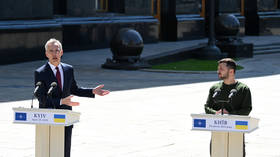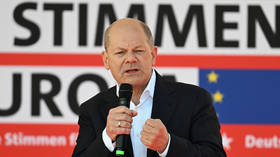NATO won’t put missile shield over Ukraine – Stoltenberg
Comment by the bloc’s chief comes following request from Kiev for its Western backers to shoot down incoming Russian missiles
NATO does not intend to use its air defenses to provide cover for Ukraine, the organization’s Secretary General Jens Stoltenberg has insisted. His comment comes days after Ukraine’s Vladimir Zelensky urged the US and its allies to shoot down Russian missiles.
Speaking to the New York Times on Monday, Zelensky stated that he sees no problem with such NATO involvement, arguing that it would not be tantamount to an “attack on Russia.”
“Are you shooting down Russian planes and killing Russian pilots? No,” he argued. Zelensky also pointed out that the US and the UK had shot down incoming Iranian missiles and drones over Israel last month. Both Washington and London have, however, argued that the two scenarios are not comparable.
In an interview with Germany’s Welt am Sonntag published on Saturday, Stoltenberg said: “While we are increasing our support for Ukraine’s self defense, there are no plans to send NATO troops to Ukraine or to extend NATO’s air-defense shield to Ukraine.”
“NATO will not become part of the conflict,” the military bloc’s chief insisted.
He also suggested that Kiev could still regain the upper hand, despite Russia currently appearing to have it. To ensure this, he reasoned, NATO member states should “send more weapons and ammunition to Ukraine, which includes air-defense systems and long-range weapons.”
On Wednesday, Poland’s foreign ministry spokesperson Pawel Wronski told Ukrainian media that his country is considering “from a legal and technical point of view” the possibility of using its air-defense systems to shoot down Russian missiles over Ukrainian territory. The senior diplomat hastened to add, however, that no decision had been made yet.
Last week, several German opposition parties also declared their support for the idea. Chancellor Olaf Scholz, however, has dismissed the suggestion of creating a NATO-enforced “no-fly zone” over Ukraine as reckless and dangerous.
“Again and again, there are those who say that one should do this or one should do that. I have a feeling that one does not speak better when foaming at the mouth. In any case, I then hear things that are not good,” Scholz said.
The Chancellor insisted that while it is important to continue supporting Kiev, neither Germany nor the EU or NATO should become a party to the conflict and should not be asked to, as such a development could prompt an “unpredictable reaction” from Moscow.
Russian officials have repeatedly said that the provision of arms, the sharing of intelligence, and the training of Ukrainian troops means that Western nations have already become de-facto parties to the conflict.







Comments are closed.